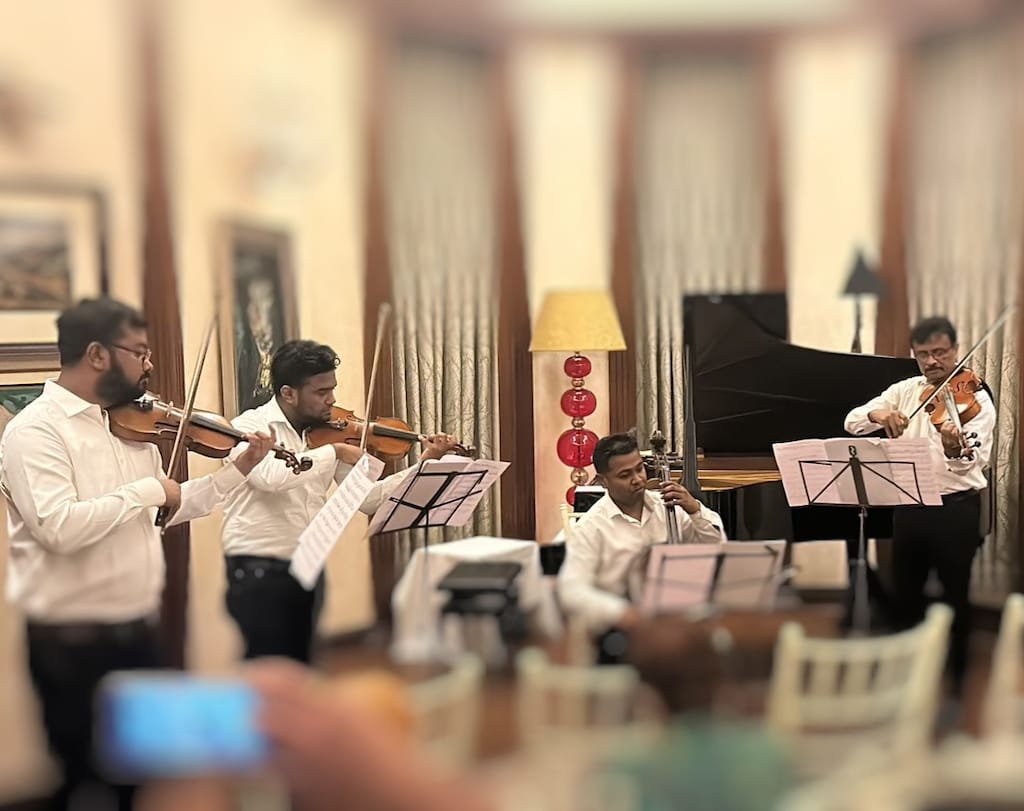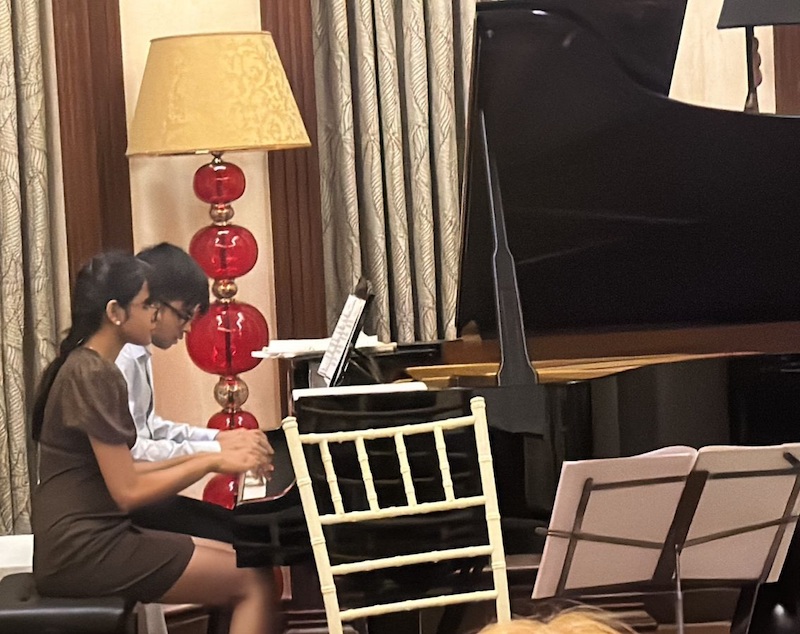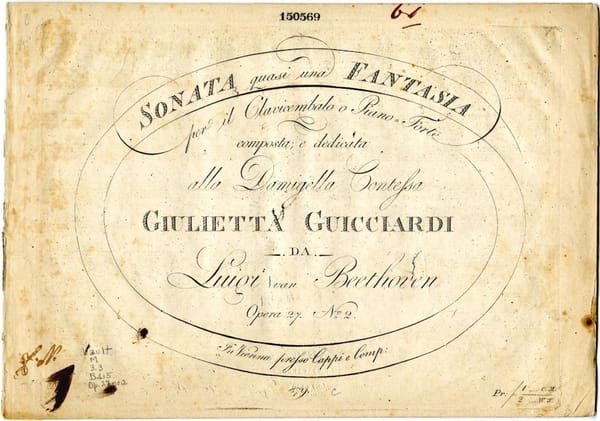A Quest for Perfection

There was a moment during the recently held House Concert organised by F. Marikar hosted at the magnificent Thapar House in Kolkata, where it seemed as though the Muses had conspired to produce a uniquely well-arranged set of circumstances to accompany the music being performed.
The Effem Ensemble, comprising musicians who trace their lineage directly or indirectly to the extraordinary work done at the Behala Oxford Mission by the legendary Father Theodore Mathieson, launched into the Oboe Quartet composed by Hussain S. Mohamed (arranged for strings by F. Marikar) at breakneck speed, drawing appreciative nods and smiles from the audience. They were treated to a rollercoaster journey comprising Shostakovich-inspired dissonant harmonies intertwined with melodies born from the beaches of the composer’s native Sri Lanka.
Perhaps there is no other chamber music group in the world which functions quite like the Effem Ensemble. Directed by Fauzia Marikar and supported by Varun Thapar, the Effem Ensemble pursues a commitment to musical excellence unencumbered by the usual concerns of public performance or studio recordings.
Every week, the four of us make our way to Fauzia’s flat where on Thursday mornings we spend a couple of hours playing, listening to and discussing the finer details of the most intricate chamber music – whether it be Beethoven’s Quartet no. 1 in F, or the famous 3rd movement (‘Nocturne’) from Borodin’s String Quartet no. 2 in D.
The musical gains from this are not immediately obvious – for example, without deadlines and concrete goals, is it possible to measure ‘improvement’? What indeed, are we playing for or towards? The answer is quite simple and ambitious in its own quiet way: a quest for perfection. To take a complex musical composition which is located beyond the technical and interpretive reach of a group of people and then to struggle with it for months on end is not a freedom afforded to most professional musical ensembles.

The House Concert is a unique musical format where the Effem Ensemble and piano students currently under Fauzia’s tutelage get an opportunity to display the ‘immeasurable gains’ made from a sustained commitment to music in front of a discerning audience not wholly anonymous. Aadya and Dhiman Narayan, the sibling duo who mesmerised those in attendance by their stellar readings of Czerny, Mozart, Joplin, Nazareth, Schubert and Chopin on the piano displayed a musical maturity beyond their years in two pieces selected from Grieg’s Peer Gynt. I remember the space created in the room during the first and last chord of Anitra’s Dance, as well as the sense of suspension of time between phrases in Åse’s Death created by this promising young duo.
A special mention must be made of Dhiman Narayan’s reading of Chopin’s Prelude no. 4 in E Minor. Chopin requested the piece to be played at his funeral along with Mozart’s Requiem, and the novelist George Sand (Chopin’s partner at that time) is believed to have titled it “Quelles larmes au fond du cloître humide?” (“What tears [are shed] from the depths of the damp monastery?”). In Dhiman’s excellent rendition one could almost imagine the descending bass line as many teardrops travelling down one’s cheek.
The Effem Ensemble started their program with a one-movement quartet written by Kedarnath Awati dedicated to F. Marikar, his teacher. During rehearsals how we could never find the right tempo for this deceptively simple piece – too slow makes it too heavy while too fast robs it of its musicality. During the performance we opted to take a brisk tempo in spite of the composer’s ‘Adagietto’ marking.
The beautiful ‘Nocturne’ from Borodin was next, and I felt proud presenting this to an audience. Just a year ago, I could not have imagined us playing it from start-to-finish, let alone performing it in public with certain interpretive skills. However, there is of course still a long way to go to reach that evasive ideal of perfection.
The piece by the Ensemble which was the highlight of the evening was the Oboe Quartet composed by Hussain S. Mohamed, a British composer of Sri Lankan origin. The piece combines an invocation to the river gods with a certain 20th century harmonic sensibility, and the setting at the Thapar House could not have been more apt for this strikingly original composition. Most members of the audience came up to me and showered praise on our reading of the 3rd and 4th movements, giving us the confidence to include more original works by this composer in our future concerts.
We have already started work on the next concert to be held in the Winter Season. These concerts aim to demonstrate the importance of music in our lives and its role in the quest for excellence which is sometimes glimpsed, but rarely grasped.





